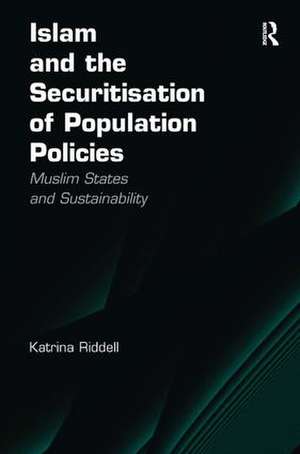Islam and the Securitisation of Population Policies: Muslim States and Sustainability
Autor Katrina Riddellen Limba Engleză Hardback – 25 aug 2009
Preț: 1000.27 lei
Preț vechi: 1219.84 lei
-18% Nou
Puncte Express: 1500
Preț estimativ în valută:
191.42€ • 207.86$ • 160.80£
191.42€ • 207.86$ • 160.80£
Carte tipărită la comandă
Livrare economică 23 aprilie-07 mai
Preluare comenzi: 021 569.72.76
Specificații
ISBN-13: 9780754675716
ISBN-10: 0754675718
Pagini: 268
Dimensiuni: 156 x 234 x 16 mm
Greutate: 0.45 kg
Ediția:1
Editura: Taylor & Francis
Colecția Routledge
Locul publicării:Oxford, United Kingdom
ISBN-10: 0754675718
Pagini: 268
Dimensiuni: 156 x 234 x 16 mm
Greutate: 0.45 kg
Ediția:1
Editura: Taylor & Francis
Colecția Routledge
Locul publicării:Oxford, United Kingdom
Notă biografică
Katrina Riddell is Honorary Research Associate, Centre for Muslim States and Societies, School of Social and Cultural Studies, University of Western Australia, Australia.
Recenzii
'Riddell offers a detailed and insightful account of population management in the Muslim context. Although birth control maybe seen by many as contradictory to Islamic teachings, Riddell has done well to carefully document the diversity of the Muslim experience and explore how Islam could in fact ensure the implantation of internationally sanctioned agenda. This book is a valuable contribution to the scholarship of contemporary Islam and a must read.' Shahram Akbarzadeh, University of Melbourne, Australia 'Muslim countries have been grappling with both the implications and different Islamic interpretations of population growth. Katrina Riddell provides a penetrating analysis of how two of the most important countries in the Muslim world have evolved and balanced concerns for security with local norms. This work is both original and timely and should be on the reading list of all who worry about our demographic future.' James Piscatori, Australian National University, Australia 'Islam and the Securitisation of Population Policies presents a wealth of information in relation to the Islamic securitisation and population policies and programs. It provides a comprehensive and useful account of the religious and socio-economic contexts within which population policy change is taking place in the two major Muslim countries. It is a valuable resource for scholars and researchers, demographers, social and political scientists as well as policy makers interested in Muslim demography.' Journal of Population Research
Cuprins
Preface and Acknowledgements; List of Abbreviations; Introduction; Chapter 1 Population; Chapter 2 Population and Family Planning in Islamic Jurisprudence; Chapter 3 Islam and Fertility; Chapter 4 Islam, Politics and Population; Chapter 5 Islam, Population, Sustainability and Security; Chapter 6 Islam, Politics and Population; Chapter 7 Islam, Population, Sustainability and Security; Chapter 101 Conclusion;
Descriere
Recognizing the role of population policies in security issues, Katrina Riddell's study takes the examples of Pakistan and Iran to examine population growth as an international security issue and to understand Muslim states' interaction with global debates on sustainability.













